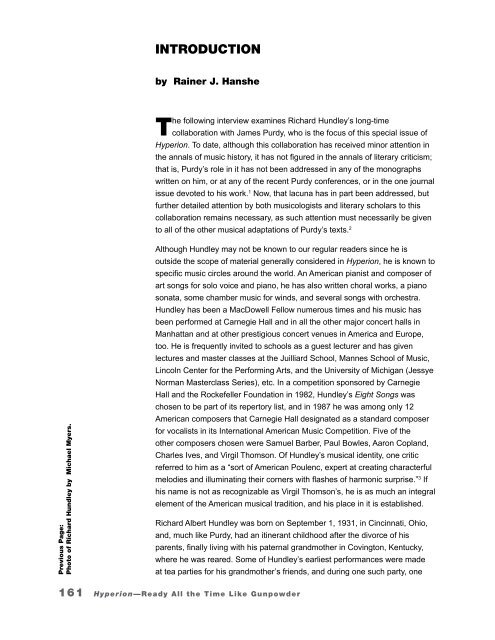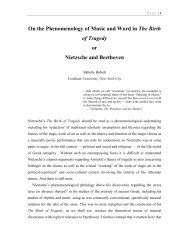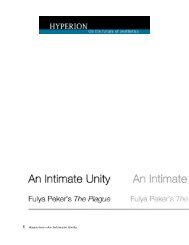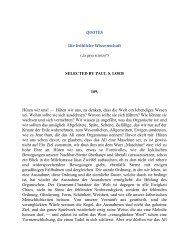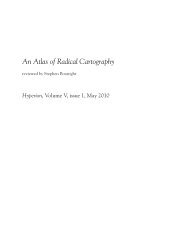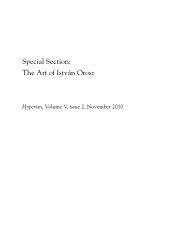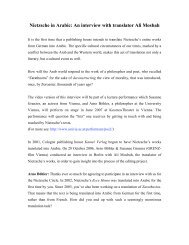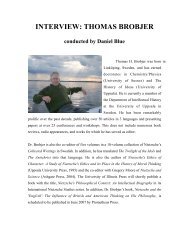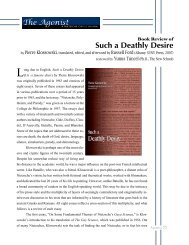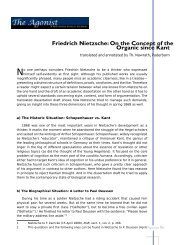Hyperion - Nietzsche Circle
Hyperion - Nietzsche Circle
Hyperion - Nietzsche Circle
You also want an ePaper? Increase the reach of your titles
YUMPU automatically turns print PDFs into web optimized ePapers that Google loves.
Previous Page:<br />
Photo of Richard Hundley by Michael Myers.<br />
INTRODUCTION<br />
by Rainer J. Hanshe<br />
The following interview examines Richard Hundley’s long-time<br />
collaboration with James Purdy, who is the focus of this special issue of<br />
<strong>Hyperion</strong>. To date, although this collaboration has received minor attention in<br />
the annals of music history, it has not figured in the annals of literary criticism;<br />
that is, Purdy’s role in it has not been addressed in any of the monographs<br />
written on him, or at any of the recent Purdy conferences, or in the one journal<br />
issue devoted to his work. 1 Now, that lacuna has in part been addressed, but<br />
further detailed attention by both musicologists and literary scholars to this<br />
collaboration remains necessary, as such attention must necessarily be given<br />
to all of the other musical adaptations of Purdy’s texts. 2<br />
Although Hundley may not be known to our regular readers since he is<br />
outside the scope of material generally considered in <strong>Hyperion</strong>, he is known to<br />
specific music circles around the world. An American pianist and composer of<br />
art songs for solo voice and piano, he has also written choral works, a piano<br />
sonata, some chamber music for winds, and several songs with orchestra.<br />
Hundley has been a MacDowell Fellow numerous times and his music has<br />
been performed at Carnegie Hall and in all the other major concert halls in<br />
Manhattan and at other prestigious concert venues in America and Europe,<br />
too. He is frequently invited to schools as a guest lecturer and has given<br />
lectures and master classes at the Juilliard School, Mannes School of Music,<br />
Lincoln Center for the Performing Arts, and the University of Michigan (Jessye<br />
Norman Masterclass Series), etc. In a competition sponsored by Carnegie<br />
Hall and the Rockefeller Foundation in 1982, Hundley’s Eight Songs was<br />
chosen to be part of its repertory list, and in 1987 he was among only 12<br />
American composers that Carnegie Hall designated as a standard composer<br />
for vocalists in its International American Music Competition. Five of the<br />
other composers chosen were Samuel Barber, Paul Bowles, Aaron Copland,<br />
Charles Ives, and Virgil Thomson. Of Hundley’s musical identity, one critic<br />
referred to him as a “sort of American Poulenc, expert at creating characterful<br />
melodies and illuminating their corners with flashes of harmonic surprise.” 3 If<br />
his name is not as recognizable as Virgil Thomson’s, he is as much an integral<br />
element of the American musical tradition, and his place in it is established.<br />
Richard Albert Hundley was born on September 1, 1931, in Cincinnati, Ohio,<br />
and, much like Purdy, had an itinerant childhood after the divorce of his<br />
parents, finally living with his paternal grandmother in Covington, Kentucky,<br />
where he was reared. Some of Hundley’s earliest performances were made<br />
at tea parties for his grandmother’s friends, and during one such party, one<br />
161 <strong>Hyperion</strong>—Ready All the Time Like Gunpowder


